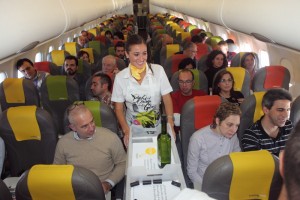
IMF Managing Director Christine Lagarde warned last week that Spain shouldn’t pour its energies exclusively into cutting expenditure but should also focus on economic restructuring.
This must have been galling for Prime Minister Mariano Rajoy, who has, even his harshest critics would grudgingly acknowledge, maintained a commitment not only to reducing the deficit but to introducing accompanying reforms designed to generate growth and boost employment.
The figures show that the deficit isn’t going down and employment isn’t going up, so while Mr Rajoy’s commitment may not be in question, his delivery certainly is.
He, of course, argues that these things take time – something with which Ms Lagarde and the European Union appear to agree, as she has called for and they are widely expected to grant an extension in the period within which Spain is required to bring its deficit below three percent of GDP.
The prime minister also argues that labour reforms introduced at the beginning of his tenure have helped to make the country more competitive, resulting in the export growth which is one of the very few economic bright spots of his 15 months in office.
The government’s commitment to restructuring corresponds to its own ideological preference. Measures to support entrepreneurs and modernise the fiscal environment in key sectors, which the prime minister was set to unveil at the end of this week, reflect Mr Rajoy’s business-friendly beliefs as much as his narrow room for manoeuvre.
They also represent a middle way between the view that countries can’t cut their way out of recession and the competing view that they can’t spend their way out of debt.
This week’s package of reforms will help to determine whether Spain can reform its way to recovery.
Dinner money
The Zarzuela Palace has let it be known that in solidarity with the general public, the Royal Household has introduced economies. The sums of public money officially allocated to individual members of the Royal Family are dwarfed by the sort of remuneration enjoyed by the directors of Spanish banks and multinational companies, but while civil list accounts are to be made public following a recently enacted law on freedom of information, details of the king’s personal fortune will not be open to scrutiny. This is to ensure that the monarch’s right to privacy is not trumped by the citizen’s right to know exactly how much Juan Carlos is actually worth.
Of course, the very fact that details of the Royal Family’s finances are being made public at all is a measure of the demystification of the monarchy that is taking place. Among the latest details to emerge from the judicial investigation into the Nóos Affair is the fact that, before his financial dealings got him into trouble, the king’s son-in-law, Inaki Urdangarin, was earning hundreds of thousands of euros in consultancy fees which may have been premised on the remarkable access to foreign dignitaries that comes with a seat at the royal dinner table.
This being the case, citizens are probably entitled to know the cost of dinner, and indeed, the cost of the silverware and the table itself.
Competitive services
After all – as anyone who has travelled by budget airline is well aware – all the little additional costs add up.
In corporate terms they add up to a nice profit, which is why International Airlines Group, parent company of British Airways and Iberia, this week agreed to pay €123.5 million to increase its stake in Vueling from just over 45 percent to just over 90 percent.
IAG boss Willie Walsh stressed that Vueling will continue in its present form, operating from its Barcelona hub. This is good news for those of us who fly with Vueling – and our number might even be swelled by members of Spain’s Royal Family in the near future if the present economy drive gathers momentum.
It could be a sign of the times. Vueling is cost effective and competitive, but it isn’t austere – thus demonstrating that you can succeed in business by emphasising competitive services rather than cuts on the one hand or extra spending on the other.
To read more by Anna Maria O’Donovan visit My Spanish Interlude.
Good analogy …Vueling and Government. Perhaps people running Vueling should be employed by Rajoy ? Apparently the king was not at all wealthy when taking on the reins invited by Franco. It would certainly be interesting to see how the public money is spent.
Rajoy has been left dangling as the hard right policy of austerity has stumbled and fallen across the Western world.Obama is trying to reverse it in the US with limited success but Europe has to change course. Spain will be dragged out of austerity in due course but voters won’t forgive the PP